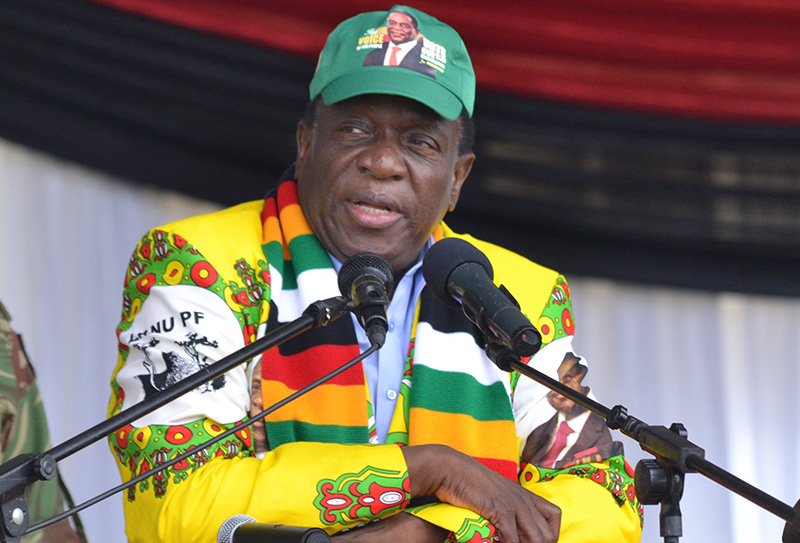
TINASHE KAIRIZA THIS week’s commemorations to mark Zimbabwe’s 42nd Independence anniversary serve as an indictment of the failure by the Zanu PF government to address the multifaceted crisis benchmarked by shrinking democratic space, unemployment and a battered economy.
President Emmerson Mnangagwa presided over this year’s Independence Day festivities held for the first time since 1980 in Bulawayo under the theme: ‘Zim@42: Leaving No One and No Place Behind’.

Bulawayo, Zimbabwe’s second capital and once the country’s industrial hub, now epitomises a derelict shell of economic activity and a city that has been marginalised over decades of gross public mismanagement.
It also did not escape Mnangagwa’s strong critics over his lethargic approach to addressing the outstanding grievances arising from the Gukurahundi atrocities unleashed by the Zanu PF government against the people of Matabeleland and the Midlands provinces during the country’s early years of Independence. Estimations by the Catholic Commission for Justice and Peace suggest that around 20 000 people died when former president Robert Mugabe’s government, under which Mnangagwa was State Security minister, unleashed the North Korean trained 5th Brigade to thwart dissent.

When Mnangagwa stormed to power in 2017 to mark the end of Mugabe’s near four-decade rule, through a military coup, he pledged to create jobs, grow the economy, curtail widespread corruption and broaden Zimbabwe’s shrinking democratic space.
Yet as he lit the Independence torch in Bulawayo at Barbourfields Stadium on Monday, critics pointed out shocking disclosures by the Auditor General (AG) Mildred Chiri almost a fortnight earlier revealing mismanagement of public funds at an industrial scale by key state institutions and the rapidly depreciating Zimbabwean dollar.
Zimbabwe has experienced widespread corruption in virtually all sectors of the economy. There have been several allegations of corruption in the areas of public procurement, land acquisitions, housing, public works, social welfare, mining, health and education sectors. Zimbabwe loses more than US$1 billion annually to corruption.
In its 2007 study titled Zimbabwe National Integrity Study, Transparency International observed that corruption “is fast becoming a way of life. The vice has become so deep-rooted and institutionalised that some people now accept it as their sole means of survival due to a total collapse of systems that offer checks and balances”.
- Chamisa under fire over US$120K donation
- Mavhunga puts DeMbare into Chibuku quarterfinals
- Pension funds bet on Cabora Bassa oilfields
- Councils defy govt fire tender directive
Keep Reading
Corruption has contributed immensely to creating and increasing poverty and exclusion over the past 42 years. There seems to be no political will to tackle the scourge.
It is worth noting that at Independence on April 18, 1980, the majority-led government inherited a solid currency that was firmer than the United States dollar and trading at par with the British Pound.

At the heart of Zimbabwe’s economic crisis, sparked by Mugabe’s ruinous policies, including the Economic Structural Adjustment Programme (Esap), notably the chaotic land acquisition, which decimated the country’s once-vibrant economy, lies a US$700 million debt overhang owed to various multilateral lenders.
Zimbabwe adopted Esap in 1990, which generally led to retrenchments, skyrocketing prices of goods, rising inflation to high levels and the devaluation of the local currency.
Rampant unemployment at 90% and currency volatility continue to cripple the fragile economy.
Economist Tawanda Purazeni said Mnangagwa’s pledge to “Zimbabwe is open for business” is a pie in the sky. The president’s rhetoric to fight corruption rings hollow.
“The economy is shrinking, the currency is on a free fall, capacity utilisation in the productivity sector is dwindling, companies are winding up operations and unemployment is skyrocketing,” he said.
“This has been the norm in the new dispensation. The Zimbabwe is Open for Business Mantra has failed to bring in positive results because the government is not walking the talk in terms of policies, actions, and activities.”
On the political front, Zimbabwe’s worsening human rights record, marked by a clampdown on the opposition and civil rights lobby groups and allegations against the Zimbabwe Electoral Commission (Zec) of vote-rigging have further isolated the country and derailed Mnangagwa’s re-engagement agenda. Drawing similarities with the goodwill that marked Edgar Lungu’s rise to power in Zambia and the accompanying disappointment that blighted his catastrophic failure, Professor of World Politics at London University Stephen Chan contends that Mnangagwa lacks the political will to break away from the tradition of Mugabe’s rule.
“Zimbabwe under Mnangagwa seems like Zambia under Lungu, to be recklessly incurring debt; there being insufficient productivity to generate revenue within Zimbabwe itself,” he said.
“There is the allowance of extensive impunities to an oligarchic class that supports Zanu PF, and this crosses over into an oligarchic military high command.
“Given this, no Zanu PF president will ever be able to or wish to, control corruption. But this means a politics of acquisition and it does not lead to a political economy of productivity, monetary circulation and constant reinvestment. Without that, there is no dynamic in the economy,” Chan said.
Nearly five years after assuming the reins, Zimbabwe remains under Western sanctions, scuppering Mnangagwa’s efforts to reset frosty relations with the West.
Mnangagwa’s critics say Zimbabwe’s leader widely known as the ‘Crocodile’ due to his political shrewdness, squandered a golden opportunity to set Zimbabwe on a firm recovery and growth trajectory after decades of Mugabe’s misrule.
However, 42 years after Independence, unbridled corruption, a stagnating economy, massive de-industrialisation, and swelling poverty stick out, like a sore thumb on Zanu PF’s track record.











